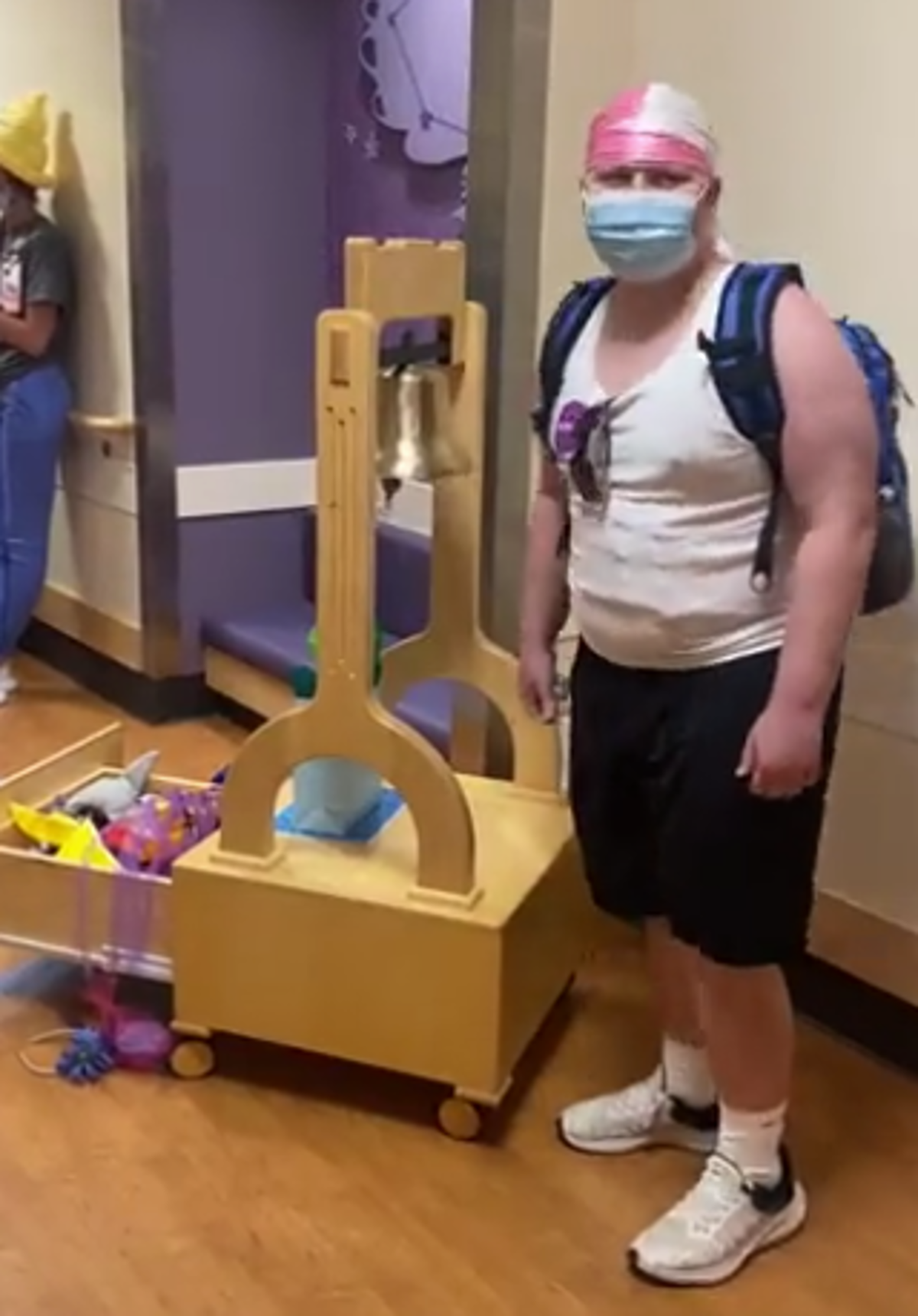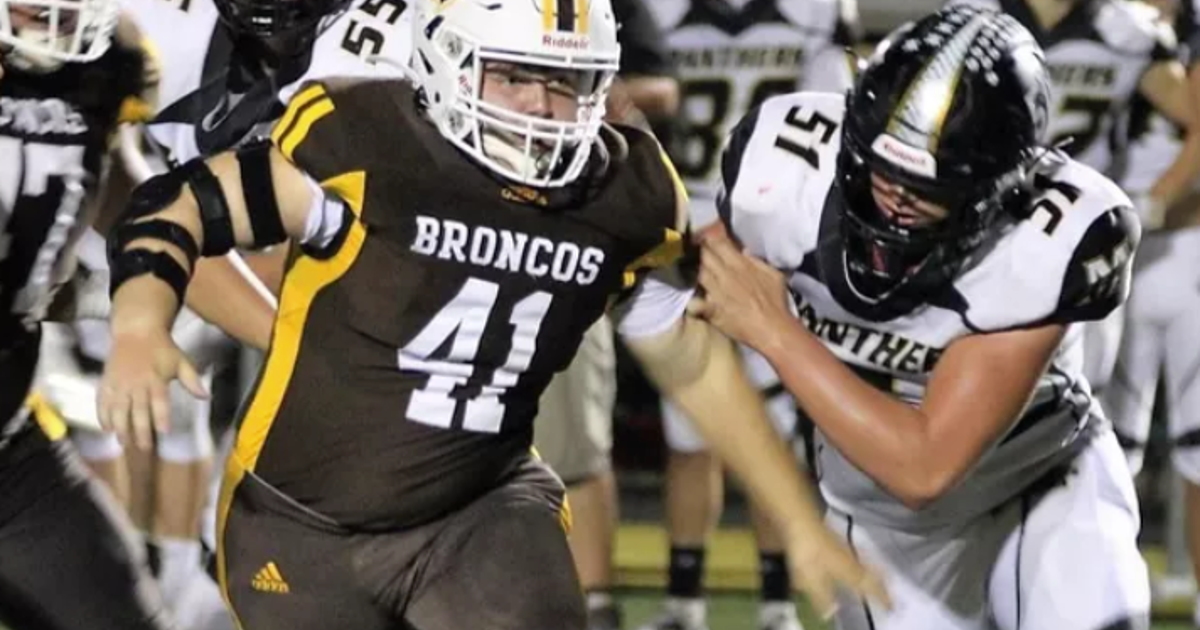A Teen's Selfless Wish
- Hunter McKinzie, a junior defensive lineman at Western Brown High School in Mount Orab, Ohio, was diagnosed with Stage 4 Non-Hodgkins Lymphoma in March.
- The 16-year-old boy finished up his chemotherapy on July 18 and has since been in remission.
- When the Make-A-Wish Foundation offered a wish to McKinzie during his treatment, the teen selflessly chose to help the Western Brown’s football program.
The 16-year-old boy, who finished his chemotherapy treatment on July 18 and has since been in remission, has remained optimistic throughout his battle with cancer and has put others first despite his own struggles.
Read More
When Osborn first learned of McKinzie’s diagnosis, he was told a miracle would be needed due to initial scans not looking good – but the team stood by the teen’s side throughout his treatment and kept his spirits up.
McKinzie’s high school, football team, family, friends, and community all worked together to raise money for the teen’s hospital bills, they even sold #HunterStrong and Prayfor41 T-shirts. A GoFundMe was also created at the time of McKinzie’s diagnosis and received nearly $12,000 in donation money.
“He’s all about the program and the team. When he was sick, you wouldn’t think he was sick. It was always, ‘How was practice?’ It shows you what an amazing kid he is and how well he was raised,” Osborn tells The Cincinnati Enquirer.
And although McKinzie isn’t playing in games yet, he has since returned to the Broncos sideline and roots his teammates on.
“Ever since I got out of the hospital, all I’ve wanted to be was here,” McKinzie tells the news outlet. “It’s good to be on the field with the guys again. I have high spirits and I’m thankful for every day.”
In regards to how he feels about his teammates, McKinzie says they’re with him “every step of the way,” adding, “I’m extremely grateful for all these guys. They’re my best friends.”
The 5-foot-8-inch, 220-pound teen now sports a helmet and pads as he cheers on his teammates during games and practices. He said his doctors have “no restrictions” on him and want him to take things slow when returning to play.
Why Sneaky Lymphoma Symptoms Make Cancer Diagnosis Difficult
Lymphoma is a cancer that often creeps in silently, without symptoms. And even when people do have signs, they don't necessarily point directly to cancer. For example, swollen glands are much more likely to be from an upper respiratory infection than lymphoma.
The sneaky nature of symptoms, coupled with a lack of screening for lymphoma, leads many people to be diagnosed at an advanced stage 3 or 4. By that point, the cancer may have already spread throughout their body. Yet even at a late stage, the outlook isn't as dire as many people might assume.
"The one thing that I always reassure people about when they are diagnosed with advanced-stage lymphoma is that, unlike other cancers, where the advanced stage is a death sentence, that's certainly not the case for lymphoma," Dr. Elise Chong, medical oncologist at Penn Medicine, told SurvivorNet in a previous interview.
For example, the 5-year relative survival rate for early-stage follicular lymphoma is 96%. Once the disease has spread, the 5-year survival rate is 85% still good odds.
"We have many treatments with which people can either be cured with advanced-stage lymphoma or have very good remissions," added Dr. Chong. "So it doesn't change how treatable someone is, even when they do have advanced-stage lymphoma."
Spotting the Symptoms
The first lymphoma symptoms can be so subtle that you might not even notice them. It may not be until you visit your doctor for a check-up that you discover there could be a problem.
Related: Football Star Trent Williams Was Told 'Not To Worry' About A 'Cyst:' It Turned Out To Be Cancer
"People say, 'But I feel completely fine,' and that's very normal," pointed out Dr. Chong. If a lump is found, often "it's only because either someone palpated a lymph node and felt some swelling in their neck or in their groin or under their arm."
Other symptoms include:
- Swollen lymph nodes in your neck, armpits, or groin
- Weight loss
- Tiredness
- Fevers
- Swollen belly
These are all more than likely to be symptoms of something far less severe, but a doctor's visit may be in order if multiple symptoms coincide.
There are also a group of symptoms doctors refer to as "B symptoms." Those include fever, night sweats, or weight loss. "If people are having any of these symptoms, it's really important that they tell their physician early so that doctors can do the proper testing," noted Dr. Chong.
She went on to say that sometimes the first sign of lymphoma appears not as a symptom but as a clue on an imaging test ordered for another reason. "I have patients who've gotten into car accidents and said, 'I had a scan of my body, and they saw these lymph nodes,' and that's how initially the lymphoma was found," explained Dr. Chong.
Contributing: SurvivorNet Staff
Learn more about SurvivorNet's rigorous medical review process.


